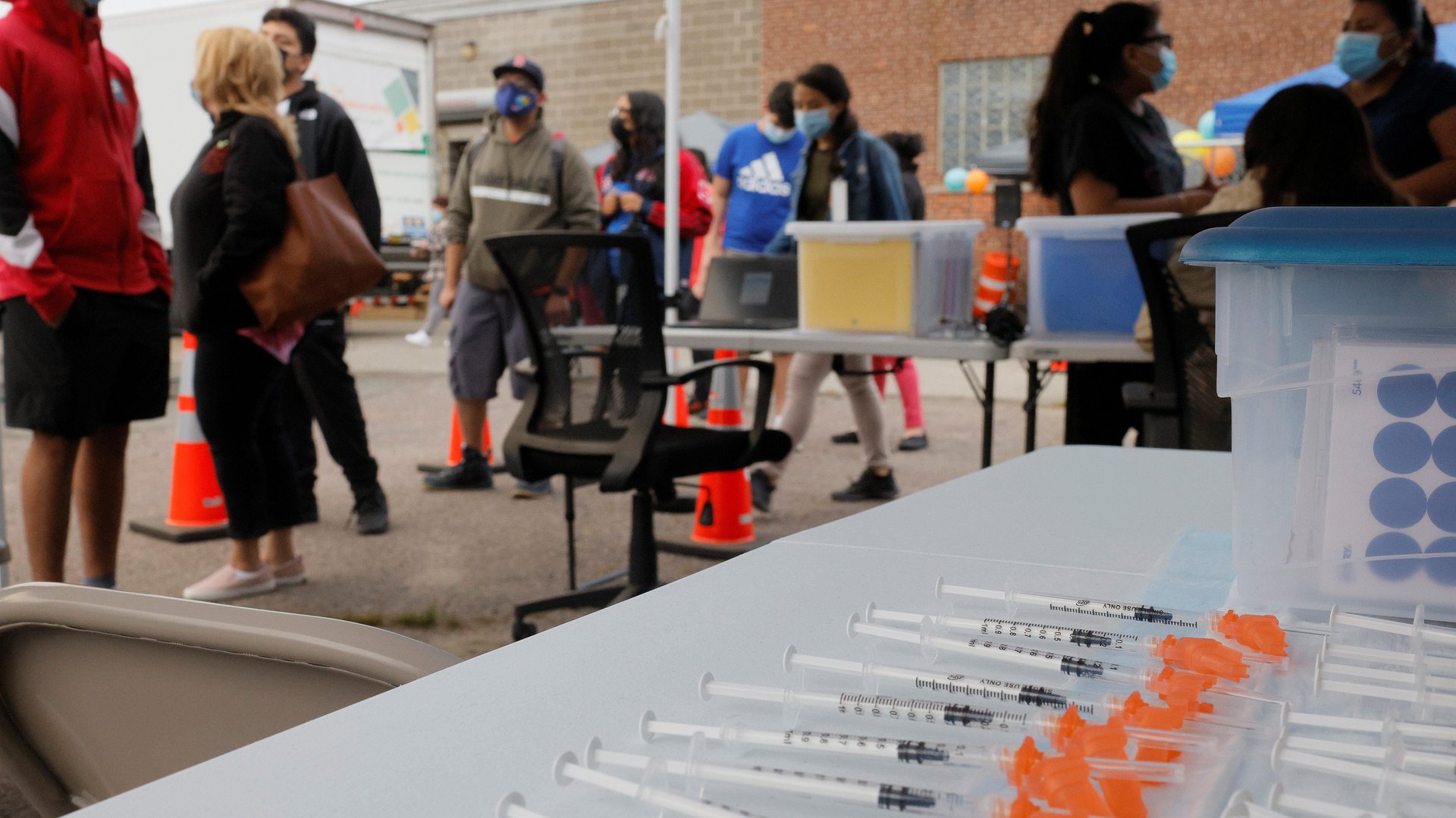The growing list of companies that require employees to get vaccinated against Covid-19
The financial services industry was one of the first in the US to require that employees returning to the office be vaccinated against Covid-19. In fact, Morgan Stanley sparked a nationwide debate about vaccine mandates in June when it barred unvaccinated employees (and clients) from its New York City office. As Matt Egan of CNN wrote then, “banking is a face-to-face business—and no one on hyper-competitive Wall Street wants to lose a deal because of a slow WiFi connection.”


The financial services industry was one of the first in the US to require that employees returning to the office be vaccinated against Covid-19. In fact, Morgan Stanley sparked a nationwide debate about vaccine mandates in June when it barred unvaccinated employees (and clients) from its New York City office. As Matt Egan of CNN wrote then, “banking is a face-to-face business—and no one on hyper-competitive Wall Street wants to lose a deal because of a slow WiFi connection.”
Now, the tech world is joining in. According to The New York Times, Google asked its US employees to get jabbed before coming back to work in mid-October—a date that was pushed back a few weeks because the more transmissible delta variant is spreading quickly in California, where the tech giant is headquartered.
Finance and tech are not the only industries facing the ethical and practical problem of what to do about returning employees who don’t want to—or can’t—get vaccinated. As businesses grapple with this dilemma, they face social and political headwinds.
Can employers mandate Covid vaccines?
According to the US Equal Employment Opportunity Commission (EEOC), federal nondiscrimination laws such as the American with Disabilities Act “do not prevent an employer from requiring all employees physically entering the workplace to be vaccinated for Covid-19″—with some important caveats.
First, employers have to apply the same standard to everyone, meaning they can’t impose a vaccine requirement that “has a disparate impact on—or disproportionately excludes—employees based on their race, color, religion, sex, or national origin.” In the US, white Americans are much more likely to be vaccinated than Black and Hispanic Americans, so in making a return to the office conditional on vaccination status, employers may end up disproportionately excluding employees of color.
Second, employers have to accommodate staff “who, because of a disability or a sincerely held religious belief, practice, or observance, do not get vaccinated for Covid-19, unless providing an accommodation would pose an undue hardship on the operation of the employer’s business.” Those reasonable accommodations can, according to the EEOC, include allowing unvaccinated employees to work remotely, or to work from the office as long as they wear a mask and get tested regularly.
Federal law is one thing; state law another. A bill passed in Texas, for example, bans employers from requiring that customers prove their vaccination status. If businesses don’t comply, they may become ineligible for grants from the state.
Which companies require Covid-19 vaccines?
Below is a list of some major US employers who have publicly said they will require employees to be vaccinated, ban unvaccinated workers from their offices, require information about employees’ vaccination status, and/or simply ask employees about their vaccination status.
Disney
Full-time and non-union employees seeking access to the entertainment giant’s US offices will have to be vaccinated, while “employees who aren’t already vaccinated and are working on-site” have until the end of September to get their jabs, according to Reuters.
Microsoft
According to The Seattle Times, “all employees, vendors, and any guests entering Microsoft buildings in the US” will have to prove that they are vaccinated.
Walmart
The CEO of the retail giant said in an email that he would require “all campus office associates and all market, regional and divisional associates who work in multiple facilities to be vaccinated by Oct. 4, unless they have an approved exception.”
Uber
The ride-sharing app will require that employees returning to US offices be vaccinated from Aug. 2. Employees can work from home until at least Oct. 25, and those returning to the office voluntarily will have to wear a mask.
Employees of the social media platform who want to return to US offices will have to be vaccinated—but Facebook said this year that most of its employees will be allowed to request to work from home full-time even after pandemic restrictions lift.
The tech giant will require US employees returning to the office to be vaccinated “in the coming weeks” and employees in other countries “in the coming months.”
Netflix
The streaming company will require all actors in its productions and the staff that work with them on set to be vaccinated, according to Deadline.
Durst Organization
The New York City real estate firm told the New York Post that non-union employees who are not vaccinated by Sept. 6 will be let go.
Delta
The airline will require that all new employees be vaccinated, CEO Ed Bastian told CNN.
BlackRock
The New York-based investment firm will only allow vaccinated employees to return to the office.
Saks
The Fifth Avenue retailer will ask all employees to return to the office in the fall, but they must be vaccinated first.
Vaccine mandates get political
Only about 49% of people in the US are fully vaccinated. As more employers consider a return to the office, the question of what to do about unvaccinated employees is only going to become more controversial.
Across the US, resistance is building against the concept of vaccine mandates in the workplace, egged on by influential anti-vaccine groups. In Texas, a judge recently upheld a major hospital in Houston‘s decision to require that its employees be vaccinated against Covid-19. (It’s not clear how the new Texas law affects that decision.) The result? More than 150 employees reportedly resigned or were fired.
This story was updated on Aug. 9.